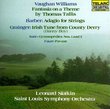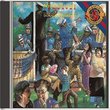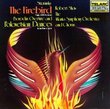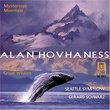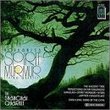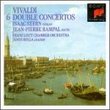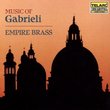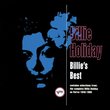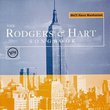| All Artists: Franz Joseph Haydn, Orchestra of St. Luke's, Sir Charles Mackerras Title: Franz Joseph Haydn: Symphonies Nos. 101 & 104 Members Wishing: 0 Total Copies: 0 Label: Telarc Release Date: 8/27/2002 Genre: Classical Styles: Historical Periods, Classical (c.1770-1830), Symphonies Number of Discs: 1 SwapaCD Credits: 1 UPC: 089408031120 |
Search - Franz Joseph Haydn, Orchestra of St. Luke's, Sir Charles Mackerras :: Franz Joseph Haydn: Symphonies Nos. 101 & 104
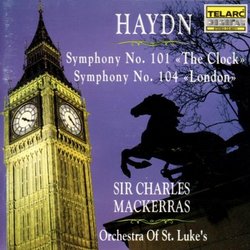 | Franz Joseph Haydn, Orchestra of St. Luke's, Sir Charles Mackerras Franz Joseph Haydn: Symphonies Nos. 101 & 104 Genre: Classical
Sir Charles Mackerras is one of the world's finest conductors. It's probably safe to say that he has never made a bad record, and his performances of music of the classical period, in particular, are always full of spark... more » |
Larger Image |
CD DetailsSynopsis
Amazon.com Sir Charles Mackerras is one of the world's finest conductors. It's probably safe to say that he has never made a bad record, and his performances of music of the classical period, in particular, are always full of sparkle and excitement. Here, aided by some very polished and lively playing from the Orchestra of St. Luke's, he turns in super performances of two of Haydn's greatest symphonies. The Clock takes its name from the slow movement, which features a ticktock accompaniment to a graceful tune that rapidly evolves into one of Haydn's wittiest inspirations. The London symphony was the last of the twelve that Haydn wrote for his two visits to the English capital in the 1790s. This is wonderful music with great sound. --David Hurwitz Similar CDsSimilarly Requested CDs
|
CD ReviewsThe Ideal Mark Amorose | Concord, CA United States | 05/07/2000 (5 out of 5 stars) "Sir Charles Mackerras's recordings of a handful of Haydn's symphonies are less well known than his complete Mozart cycle. This is most unfortunate, for his Haydn is even better than his Mozart. Some critics felt that Mackerras's historically informed Mozart performances, while technically superb, were a bit lacking in feeling. Such is certainly not the case with this disc, which more than any other recording (even Hogwood's outstanding 'Surprise' and 'Miracle' symphonies - sadly now out of print) has convinced me of the value of authentic 'period' performing style. I have listened to much Haydn: 'big band,' 'original instruments' and everything in between; nothing has satisfied me as much as this disc. Here is period performance at its best: faithful to Haydn's tempi and repeats, yet performed on modern instruments. The most common, but most misguided, objection will be to the speed of the minuets. Haydn's minuets were never intended to be true, i.e., dance-able, minuets. Mackerras's (and Weil's and Hogwood's) tempi only seem too brisk to those who have gotten used to hearing Haydn played much too slowly by romantic interpreters. Listen to these performances for awhile, and the usual renditions will seem unbearably sluggish. Telarc's recorded sound is excellent, as usual. This is, for me at least, the Ideal recording of the 'London' and the 'Clock.'" New life for these symphonies Ryan Richards | Midland, MI United States | 12/27/2000 (5 out of 5 stars) "I've really grown to like Sir Charles and the Orchestra of St. Luke's, and this is perhaps their finest recording yet. As noted, they do a heck of a job putting life and vigor into these symphonies; it really sounds like the players are having a good time playing as opposed to just reading some notes on a page. The sharp accents and powerful dynamic changes here made these sound almost like Romantic-era compositions, showing off the true wit and innovation of Papa Haydn's music. In particular, the minuets gain a lot of sparkle from their up-tempo treatment--it's disconcerting at first, but it makes them sound like actual movements as opposed to drudgery to get through before the finale (the way they admittedly always were for philistines like me). Yes, there are some hard moments to stomach on this CD--the strings get drowned out by the winds at an occasional crucial spot (the ends of the finales of both symphonies), and there are points where the dynamics could have been interpreted with more care. But so what? The end result is a CD that combines powerful playing with exceptionally skillful technique, and brings an astonishing amount of new life to these oft-played symphonies. Given the expansive playing venues and enthusiastic audiences in London, this is most likely the way Haydn meant his music to sound. It definitely got me listening to these works again." Haydn And Mackerras (Review No. 2) Erik North | San Gabriel, CA USA | 05/25/2009 (5 out of 5 stars) "In the continuing argument over which way is better to perform the symphonies of the Viennese classical era--on period instruments, or on modern ones--Sir Charles Mackerras has been quite successful at striking a balance between the two camps, particularly with the symphonies of Haydn, by conducting them with the modern-instrument Orchestra of St. Luke's while utilizing authentic performance practices in terms of tempo. He and the O.S.L. did this quite well on their recording of Haydn's 100th and 103rd symphonies; and they repeat the feat here with the composer's 101st and 104th symphonies.
Again, the tempo markings are brisk but they are never unduly rushed; there are no extremes or eccentricities here. The famous tick-tock movement of the Andante of No. 101 that gave its nickname the "Clock" is handled quite well by Mackerras and the orchestra; and the bold opening of No. 104 (the so-called "London" symphony, and the last symphony Haydn ever composed) is imposing even with a chamber orchestra ensemble like the O.S.L., giving us a precursor to the similar slow openings of the symphonies that were to come from Beethoven and Schubert early in the 19th century. These recordings help to ensure that Haydn's name remain as immortal in the musical sphere as that of his younger contemporary Mozart, whose influence on these works is evident. As with their previous recording of Haydn's 100th and 103rd symphonies, Mackerras and the O.S.L. have delivered another winner here as well." |

 Track Listings (8) - Disc #1
Track Listings (8) - Disc #1
